“On the western shore of Lake Turkana” and other poems by MONICA CORISH
Before a neck injury in 2005 Irish poet Monica Corish spent many years travelling, living and working in Africa. Based now in Co. Leitrim, in her poems here Corish brings the reader from the sublime beauty of a night spent on a mountaintop near Lokichokio in northern Kenya in her poem, “On the western shore of Lake Turkana”, to a meditation on life stages in her poem, “Once I Saw a Lioness”. In the latter poem the narrator leaves behind exotic adventures and appreciates the grace of love, and the beauty of the quotidian, in mid-life. And finally her poem, “Maeve’s Version”, with accompanying video, grows out of Corish’s fascination with Irish myths – the poem tells the backstory of the epic tale, An Táin Bó Cúailnge, the Battle Raid of Cooley, from the legendary Queen Maeve’s fiery point of view. Monica recorded this poem for “Poetry and Story Inspired by Landscape and Myth”, a series of programs broadcast on the Glens Centre YouTube channel in June 2020.
Night sky in Africa
On the western shore of Lake Turkana
There’s a coffee-table mountain.
We climb for an hour in desert heat
An easy sweat
Reach the plateau by six.
Night falls like a guillotine
A cold blanket over us
Far away, pitch indigo
No moon.
Stars
Every star
All the hot stars
From now to the edge of time.
Karanga camp above cloud level
Once I Saw a Lioness
Elephants grazed in my past –
mountain gorilla, wildebeest, Thompson’s gazelle.
Once, up close, I saw a lioness
and her mate, drowsily digesting their dinner.
I leaned out the window, thumped
on the side of the van. They granted me,
despite my ardent desire,
no closer audience.
I loved adventure then,
kindly strangers, strange lands.
Now I stay late in bed beneath my golden duvet.
Snug, tea in hand, morning-kissed, finding new lines tucked
inside a line of poetry. Today it’s Richard Snyder:
Let true thanksgiving bruise our lips.
You swig coffee in your room, read Delancey Place,
The Writer’s Almanac, email me juicy poems.
Eleven or thereabouts we meet in the kitchen
for toast, Earl Grey tea, rhubarb jam with cloves.
My younger self saw no wonder in the everyday,
left no novel stone unturned.
In middle age, I’m pleased to say,
I’m sweetly bored.
Roadside village with jacaranda trees; a Dendrosenecio kilimanjari, a succulent like plant unique to the Kilimanjaro region; stone towers on Kilimanjaro’s summit.
~ ~
MAEVE’S VERSION as performed by Monica Corish
Maeve’s Version
I didn’t start that battle.
Well, I did –
but not the way you think I did,
and it was never about the bulls.
You know how it is in a marriage –
the reason you’re fighting
is never the reason you’re fighting.
Aillil knew that in marrying me
he had married the Earth –
the curve of my mountains,
my rivers in spate,
my honey-drunk bees sucking life.
And he knew – everyone knew –
that all his power came through me,
Maeve, Goddess and Queen,
bestower of sovereignty.
We started well.
A comrade at my side –
the crow of a cock –
the strength of a bull –
laughter – pleasure – babies –
handsome sons, splendid daughters.
It all went to his head.
He got cocky in a new way,
started strutting, chest out, thumping,
urging the men to say
No – I will not be led by a woman.
All the young cocks and all the young bulls
shouting No, No, No –
We will not be led by a woman.
It didn’t take long
before Finnbhennach heard,
my fertile white-horned bull,
sire to half the calves of Ireland.
He pawed the ground and snorted
No – I will not be led by a woman.
I watched
as Finnbhennach – my Finnbhennach –
left my herd and bowed
his lovely white-horned head to Aillil.
I went to war over it.
I’m not saying I was innocent, I’m not saying
I didn’t spill blood, and plenty of it.
I’m only saying –
My cause was Life.
I didn’t win.
He thinks he did, but he’s wrong,
and the whole Earth knows it –
the weeping ice –
the dying honeybee –
the lonesome ground.
All this trouble,
born of a question
that should never have been asked:
Will the Earth rule herself?
Or will the Earth be ruled?
So. Here I am, standing upright
in my cairn on my mountaintop.
Eternally ready for battle?
Another cock and bull story.
I am Maeve!
I am honey and mead,
I am my intoxicating, honey-drenched thighs,
and I’m waiting.
Oh women of Ireland,
rouse and body me back to life!
Oh men of fierce and tender heart,
remember me.
I am the Earth,
eternally ready for love.
I’m here
and I’m waiting.
Any time now would be good.
Knocknarea, Sligo. At its summit is a large cairn believed to be the burial chamber of Queen Maeve
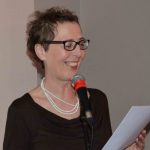 Monica Corish is an award-winning writer of poetry and short stories, and an Amherst Method writing workshop leader. She lives in north Leitrim, and is currently working on a pre-historic novel set on the Coolera peninsula outside Sligo town. She has published a collection of her poetry, A Dying Language, and poems from the collection have won the North West Words Poetry Prize and been shortlisted or commended for a number of awards, including the Hippocrates Prize for Poetry and Medicine. They have been published widely in Ireland and the UK, including in Poetry Ireland Review. Her website is www.monicacorish.ie.
Monica Corish is an award-winning writer of poetry and short stories, and an Amherst Method writing workshop leader. She lives in north Leitrim, and is currently working on a pre-historic novel set on the Coolera peninsula outside Sligo town. She has published a collection of her poetry, A Dying Language, and poems from the collection have won the North West Words Poetry Prize and been shortlisted or commended for a number of awards, including the Hippocrates Prize for Poetry and Medicine. They have been published widely in Ireland and the UK, including in Poetry Ireland Review. Her website is www.monicacorish.ie.
Photographs: “Karanga camp above cloud level”, and other photographs in the Mt. Kilimanjaro area were taken by Kristina Beote; “Night sky” was taken by Steve Ridley; and “Knocknarea” was taken by Christine O’Connor.
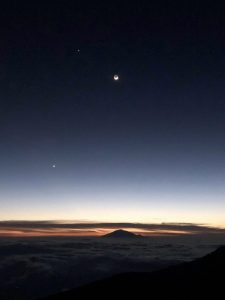
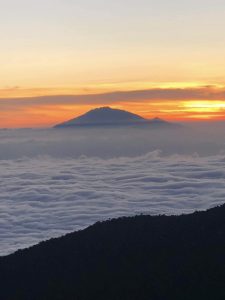
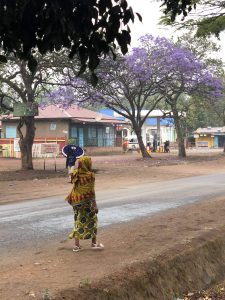
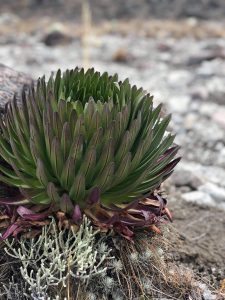
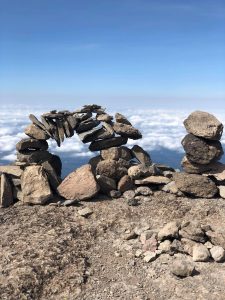
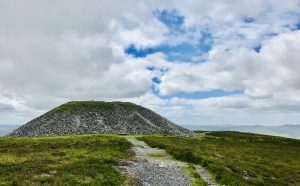
That’s brilliant. I remember visiting Maeve’s grave at Knocknarea. You did her as proud as Yeats.
Monica I climbed Croagh Patrick today and relaxed in the afternoon by checking in on Trasna.
( always guaranteed for a positive experience )
What a treat your poems are.🙏
After “MAEVE’S VERSION” I an putting a climb to her grave in Knockree on my
‘ to climb list ‘ with my daughter Maeve .
Loved the African poems too.
Thank you.
Knocknarea even !☺
Breathtaking, Monica. And I love the backdrop to the video.